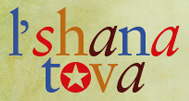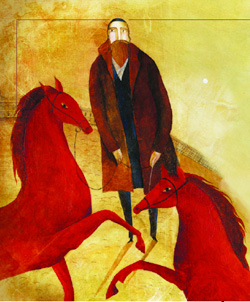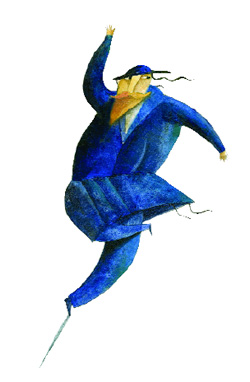Holidays
Rosh Hashanah
L’Shana Tova

Imagine, every single one of them up to mr. big himself takes bribes. Don’t be shocked now—he accepts them too, if he gets an offer. What’s that? You don’t believe me? You’re all laughing, eh? Well, have fun…. Ready now? Have you all laughed yourself dry? Now gather round me, brother Jews, and listen to a story that happened a long time ago to none other than my grandfather, may he rest in peace. It happened in the good old days when Czar Nich was boss. Why’re you nudging me? What’re you scared of? You think these peasants sitting here know what we’re jabbering about? They won’t understand a word, blast them. I won’t be obvious and where necessary I’ll throw in some Hebrew. Just pay close attention and don’t interrupt me and everything will be fine.
To make a long story short. it happened during the reign of our present Mr. Big’s grandfather, after whom he’s named. Our fathers and grandfathers couldn’t forget that old Mr. Big for all the fine and dandy things he let loose against us. In short, their whole life
hung on a thread. We existed by the grace of little Mr. Big, or Buttons, as we called him, who ruled every shtetl. This Buttons liked to have his palms greased and loved Friday-night gefilte fish and tumblers of whiskey. So long as this went on the Jews breathed free and easy, did business, plied their trades and had a wonderful time.
But once—and whenever you hear but once, you know trouble’s coming—something happened. Buttons kicked the bucket. He suddenly upped and dropped dead and was followed by a new Buttons, a Haman, a villain, a rat, the likes of which you’ve never seen! He just couldn’t be greased! They tried bigger bribes. Still, no. They tried the real thing—big money. Still nothing doing. He wouldn’t go for gefilte fish. They dropped hints about rare liqueurs. He didn’t drink. Talk of being ethical! He was as clean as a whistle! If you begged him, he stamped his foot, kicked you out on your ear and then did things that just weren’t done. He gave summonses and fines. Didn’t let Jews do business or let Jewish teachers teach. If he saw a young woman, he’d rip off her marriage wig; a young man, he’d snip off an earlock.

“That’s what Mr. Big does, too,” he used to say. Then he would beam, get hysterical at his own joke and shake until tears came…. This made the Jews seethe with anger. But nothing could be done. What could they do? They did what Jews always did. They sighed, called meetings and pondered how to get rid of such a Haman, the devil take him.
Then they went to my grandfather, Reb Anshel, may he rest in peace. Grandpa Anshel (after whom I’m named) was rich and came from a fine family. He was a follower of a Hasidic rebbe, a trustee in the synagogue, a big shot with the authorities.
“Reb Anshel, save the town! Tell us what to do.”
My grandfather listened and said he would go and see his rebbe. “We’ll do what he suggests.”
No sooner said than done. Grandfather Anshel got into his carriage one hot summer day and told the rebbe the whole story. “It’s horrible. We have a man whose hands are clean.” The rebbe closed one eye and gestured, as if to say, I know everything.
How did he know? Only fools ask such questions. Those rebbes knew everything…. A minute later the rebbe called out. “May you be inscribed for a year of health.” This astounded my grandfather. Here it was the height of summer and Rosh Hashana was a long way off. But one doesn’t question the rebbe. Grandfather waited patiently. Before bidding him goodbye, the rebbe called him over and said:
“Listen, Anshel”—(they were all on a first-name basis with each other, those Hasidim)—he sighed, “go home in peace and good health. Tell your shtetl I’ve wished them a good year. When the big fair comes buy a pair of the best horses money can buy. Full-blooded roans. I want both of them to be exactly alike, twins, as if one filly had borne them, and completely spotless. Then hitch those horses to a fine carriage and drive them to that city where Mr. Big makes his home. It starts with the letter P. Rest for three days and the next day, right after you’ve said your morning prayers, and the next afternoon, just before sunset, drive around the palace. Sit like a lord who’s out for a pleasure ride. If anyone asks you: how much you want for those horses, say you’re not a horse-dealer…. Now Anshel,” the rebbe concluded, “go home and may God grant you success.”
That’s exactly what happened. When the big fair came, per the rebbe’s words, my grandfather bought a pair of full-blooded roans from a gypsy, the likes of which our forefathers had never seen. My grandfather was no connoisseur of horses, but they were exactly alike and spotless too. Just like the rebbe had predicted. After eying those horses, my grandfather wouldn’t budge. The gypsy, noticing that the horses had turned my grandfather’s head, naturally put such a price on them that it made Reb Anshel’s blood run cold. But there could be no excuses. It was a matter of life and death. The town had to be saved. The Jews had pawned everything they had. My grandfather started bargaining with the gypsy. But you can be sure he didn’t leave without those horses. He bought them, hitched them to a carriage and left immediately. He and the horses arrived in P about a month before the start of the Jewish New Year. He rested three days and three nights. Then, the next morning after prayers, and again before sunset, he rode slowly around the palace gates. He didn’t rush. He had plenty of time and rode back and forth in front of the palace three times. He followed the rebbe’s commands to a T.
To make a long story short, he drove around the palace one day, two days, three days. Nothing happened. He became depressed. What would come of it all? But if the rebbe had said something, surely it wasn’t in vain. So listen to the upshot! Once, as he was driving in front of the royal palace, he saw a Buttons approaching, probably one of Mr. Big’s adjutants. He stopped my grandfather, whistling strangely right into his face, inspecting the horses from all angles, like one who understood horseflesh.
“Listen here, you, how much do you want for these horses?”
Exactly what the rebbe said would happen. Reb Anshel’s heart leaped a bit and he answered as he was commanded:
“I’m not a horse-dealer.”
 The Buttons looked angrily at him. “How do you come to such fine horses?”
The Buttons looked angrily at him. “How do you come to such fine horses?”
This time grandfather was quiet. He didn’t know what to say, because the rebbe hadn’t mentioned a question of that sort. Infuriated now, the adjutant said: “Perhaps you’ve stolen them, huh?”
At this grandfather’s heart sank. He hoped everything would turn out all right, but he couldn’t say a word. Finally, God inspired him with: “Sir! These horses are mine. I bought them from a gypsy at a fair. I have witnesses. A whole town full of Jews.”
“So you have witnesses, huh?” the adjutant said. “I know your sort of witnesses.”
Then he started whistling again, looking the horses over. Finally, the adjutant said: “You know, the Czar likes your horses.”
“What’s the drawback?” said grandfather. “If he likes the horses, then my horses can be his horses.”
Don’t ask how Reb Anshel hit upon an idea like that. If it’s fated, God gives you bright ideas. Since he was a wise man, as I’ve already pointed out, he understood that if the rebbe told him to parade around the royal palace, there was a reason for it—as you’ll soon see.
Well, in a nutshell, they took the horses’ reins and led those full-blooded roans right into the courtyard and showed them to Mr. Big himself. As soon as he saw the horses, he couldn’t leave them. Some sort of mystic power was in those animals. He looked at those horses for about an hour, staring at them and showing them off to his entire court. He fell in love with them at first sight.
Meanwhile, Grandfather Anshel was standing quietly on the side, watching. He recognized Mr. Big immediately; he knew him from his pictures. But never mind. It didn’t faze him at all. He was just a man, like the rest of them. Then Mr. Big approached grandfather. And as soon as he looked at grandfather, a chill ran through his bones. And when he spoke with his lion’s voice, grandfather’s heart froze.
“How much do you want for those horses?” Mr. Big asked Anshel.
Grandfather could hardly speak. His mouth was dry, and he felt his voice shaking:
“I don’t sell horses. But if His Majesty has taken a liking to the horses, and if His Majesty will not be angry with me, let the horses be led into His Majesty’s stables. That’s where they belong.”
He couldn’t say anymore, for Mr. Big then looked at grandfather and his soul left him. And besides, Mr. Big moved closer to Reb Anshel and continued talking to him. My grandfather practically turned into a heap of bones.
“Listen here. Perhaps you want some special favor. If you do, tell me right now with no bluffs, tricks, flim-flam or long-winded Jewish commentary. For if you do, it’ll cost you dearly.”
Well, my dear friends, what do you think went through Grandfather Anshel’s mind at that time? Surely, the mother’s milk in him curdled. But, since Reb Anshel was a brave man, as I told you, it didn’t faze him. He plucked up his courage and told Mr. Big:
“Your Majesty! King! I swear that I have no underhanded intentions, and I’m not the sort who likes to bluff or trick anyone. I don’t ask a thing of His Majesty. But I would consider it an honor and the greatest of favors if I could be worthy of having my horses in His Majesty’s stables and if His Majesty would ride them.”
Naturally, Mr. Big was moved by these words. He now started talking in a softer tone. His voice, his manner, his words—all changed. He was a new man. Then the Czar left the courtyard and headed for the palace—with Grandfather Anshel trailing behind him. It didn’t faze him a bit, but his knees shook and his heart ticked like a grandfather clock. Can you imagine—being in the Czar’s palace! Wherever you looked, there was only silver and gold and everything was carved out of ivory. Crystal above, marble below.
All that wealth made grandfather dizzy, but he controlled himself. Then Mr. Big sat down and asked grandfather to have a seat too. He offered grandfather a cigar, and grandfather took it and smoked it. It didn’t faze him a bit. In the meantime, she came in—the Czarina herself, draped in satin and silk and covered from head to toe with diamonds and other sparkling gems. She was as beautiful as the Queen of Sheba. So lovely, you couldn’t even look at her face. Seeing a Jew in the king’s company, comfortable and smoking a cigar, she naturally became very angry and looked very sternly at him, as if to say: What’s this Jew doing here?
But by now Grandfather Anshel had become so high and mighty, it didn’t bother him. He continued smoking and didn’t even glance at her. But she kept staring at grandfather, looking daggers his way. Mr. Big understood that the guest didn’t please her, but he ignored this. He looked at the Czarina and said cheerfully:
“Dushinka, how about some tea?”
She remained silent.
The Czar repeated: “Dushinka. Tea!”
Again, she remained silent.
Now the Czar didn’t delay, but stamped his foot and roared at the top of his voice: “Dushinka! Tea!”
The window panes shook. It was nothing to sneeze at. Treason, you know…. Immediately, adjutants and generals started pouring into the place. In a flash a boiling samovar, all sorts of homemade jams, egg bagels and boiled eggs were ordered. Boiled eggs—for the Czar knew that a pious Jew would not touch anything but boiled eggs. The Czar asked him to eat and drink and make himself at home. By and by, he asked grandfather who he was, what he did, how he earned his living and how the Jews of his area were doing. He wanted to know everything. And he was so friendly too. And Grandfather Anshel answered every single question. When the Czar asked about the Jews, grandfather thought: Now’s the time to bring up the subject. Well, he told Mr. Big everything—and Reb Anshel had just the tongue for it.
“Here’s the whole story, Your Majesty. Your Jews have no complaints. But if His Majesty is in a good mood, and if I have found favor in His Majesty’s eyes, and if His Majesty will not be angry at his servant, I shall tell you the whole truth. I’d like you to know, Your Majesty, that things are all right in your country and that the Jews live by grace of the Buttons. If he’s just a regular Buttons, it’s fine and dandy. But if, God forbid, he isn’t, then there’s trouble. Not long ago, a new Buttons came into our shtetl—clean as a whistle! And because of that, we’re at the end of our rope! There’s no one like him in Your Majesty’s entire realm. That a Buttons be incorruptible is something unheard of. It’s the eleventh plague!”
Mr. Big looked at him and said: “I’ll be honest with you. You’re talking in riddles and circles and I haven’t got the faintest notion what you’re trying to say. What do you mean by—clean as a whistle? And what do you mean by a—Buttons?”
“By clean as a whistle,” grandfather said, “I mean a man whose palms won’t be greased. By Buttons, I mean a little Mr. Big whom you appoint to watch over every little town. Well, Buttons watches those towns and in a few years becomes very rich. Who from? The Jews, of course. They’ve gotten used to it. Because just as Jews know they must pray every morning, they also know that an official must take, and a Jew must give. Like in our holy books. We always kept giving—for sacrifices, for the Temple, here, there. You’ve been so kind to your servant until now, so please hear him out.
“I want you to know, Your Majesty, that your whole kingdom, from east to west, from north to south, is filled with takers. The only ones whose palms you can’t grease are cripples who have no hands. And even someone with no hands will tell you to slap it down on the table. There’s nothing wrong with that either. You have to live and let live. The Bible tells us to get along with our neighbor. So our commentator, Rashi, says—but if his dog barks, muzzle him.”
Why are you men looking at me? Strange, right, that a Jew should talk this way to a king? Well, take it or leave it. I wasn’t there—that any child will understand. But this is the story that my father—may he rest in peace—heard from his father. And I assure you that neither my father nor my Grandfather Anshel were liars. The long and the short of it was that my grandfather said goodbye to the Czar and went straight to the rebbe, reporting back on his trip.
It was just before Rosh Hashana. Once in the rebbe’s house, he stood (one always stood before the rebbe) and told him the whole story from beginning to end. It turned out that Grandfather Anshel needn’t have bothered, for the rebbe knew all about it anyway. Then why did he let him keep talking? Because it wasn’t polite to interrupt a man while he spoke. You see, those Hasidim are very strict about etiquette.
After the Sabbath ended grandfather set out for home and made it just in time before the onset of Rosh Hashana.
Now listen to this. On Rosh Hashana night, when the Jews were leaving the synagogues after prayers and wishing each other gut yontef, a year of peace and good health, a rumor flashed through town that our Buttons, our Haman, may he shrivel up, had been fired, and in his place the authorities up-on-high had sent a new little Mr. Big, a man clever and wise, good and kind—in short, a jewel of a gentile, a regular Buttons. He took. He was a taker! But he had one flaw (did you ever see anyone completely perfect?) that was discovered later. He had a mighty dry palm.
It had to be greased good and heavy. In fact, he took enough for himself and the Buttons before him. He took from the quick and from the dead.
But the upshot was that the Jews had a happy Rosh Hashana and an even happier Sukkot. Don’t even ask about Simhas Torah! Then the Jews really had a grand time. It was said that even little Mr. Big, that is, the new Buttons himself, had a few drops and danced with the rest of the Jews. Well, it looks like we’ve arrived at our station. Be well and have a happy…







 Facebook
Facebook Instagram
Instagram Twitter
Twitter
Leave a Reply